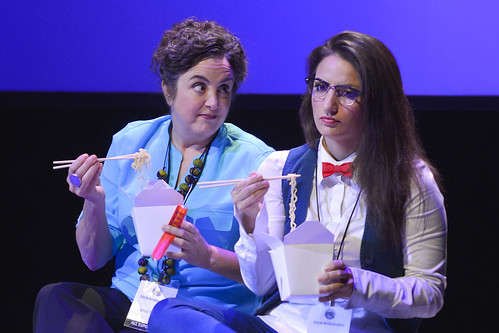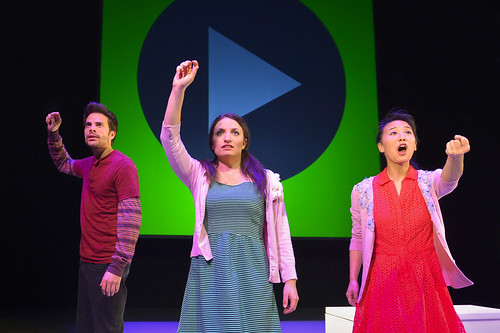Fractured tales confound in ACT's Love and Information
 Cindy Goldfield (left) and Dominique Salerno star in Caryl Churchill's Love and Information, a collection of 57 scenes that challenge audiences to consider the fateful, intimate dance between the virtual and the real, and the ways we filter data in the Information Age. Below:Joel Bernard, Salerno and Christina Liang in a short scene of love, information or both. Photos by Kevin Berne
Cindy Goldfield (left) and Dominique Salerno star in Caryl Churchill's Love and Information, a collection of 57 scenes that challenge audiences to consider the fateful, intimate dance between the virtual and the real, and the ways we filter data in the Information Age. Below:Joel Bernard, Salerno and Christina Liang in a short scene of love, information or both. Photos by Kevin Berne
Confounding and captivating in equal measure, American Conservatory Theater's debut production in the newly renovated Strand Theater certainly lives up to its title. Caryl Churchill's Love and Information sounds like a generic title for just about anything in our short-attention-span world, on or off line, and that seems to be part of the point.
More like a curated collection of scenes and short films than an actual play, Love and Information breaks down into 57 scenes (like Heinz, 57 varieties) for a total running time about about 100 minutes. There are 12 actors deftly assaying hundreds of characters (or sketches of characters, really), and the whole thing is slickly, fluidly directed by Casey Stangl.
Some scenes are more memorable than others – a man attempting to share mnemonic games with a woman is delightfully surreal ("the hedgehog is in the microwave"); a brother and sister redefine their relationship in a shocking way; a text battle between wife and philandering husband takes place under the surface of polite dinner conversation; a young woman describes to a friend what it's like growing up unable to feel any pain at all; a grandmother attempts to teach a grandchild about fear; a man who experiments on chick brains regales a date with tales of decapitation and brain slicing. And the list does go on.
About half the scenes feel like they're part of a bigger, more interesting play. The other half feels like filler.
It's all very proficiently done, and Stangl, working with scenic designer Robert Brill, lighting designer Lap Chi Chu and projection designer Micah J. Stieglitz show off the Strand beautifully. The sound, the sight lines, the vibrancy of the room itself – it's all thrilling and makes for an ideal second ACT stage.
What I didn't get from the play was satisfaction. There isn't much connective tissue here, and that seems to be part of the point. We're fragmented, we're chaotic, we're filtered. Technology has increased our options for communications but has done the quality of communication no favors. That comes through here, but what I missed (after hitting the wall at about the one-hour mark) is that moment when it all comes together, when the fragments coalesce into something bigger and more meaningful. And though the end incorporates an appealing slice of Electric Light Orchestra, I never felt the whole became more than the sum of its attractive, often intriguing parts.
Maybe that's what Churchill is after here: there is no sum game anymore. It's all just parts. Maybe so. But as long as those parts keep coming on the stage of the Strand, I'm happy. San Francisco's newest theater should be its most active and alive for many years to come.
[bonus interview]I interviewed Love and Information director Casey Stengl about her work on the play for the San Francisco Chronicle. Read the feature here.
FOR MORE INFORMATIONCaryl Churchill's Love and Information continues through Aug. 9 at ACT's Strand Theater, 1127 Market St., San Francisco. Tickets are $40-$100. Call 415-749-2228 or visit www.act-sf.org.
